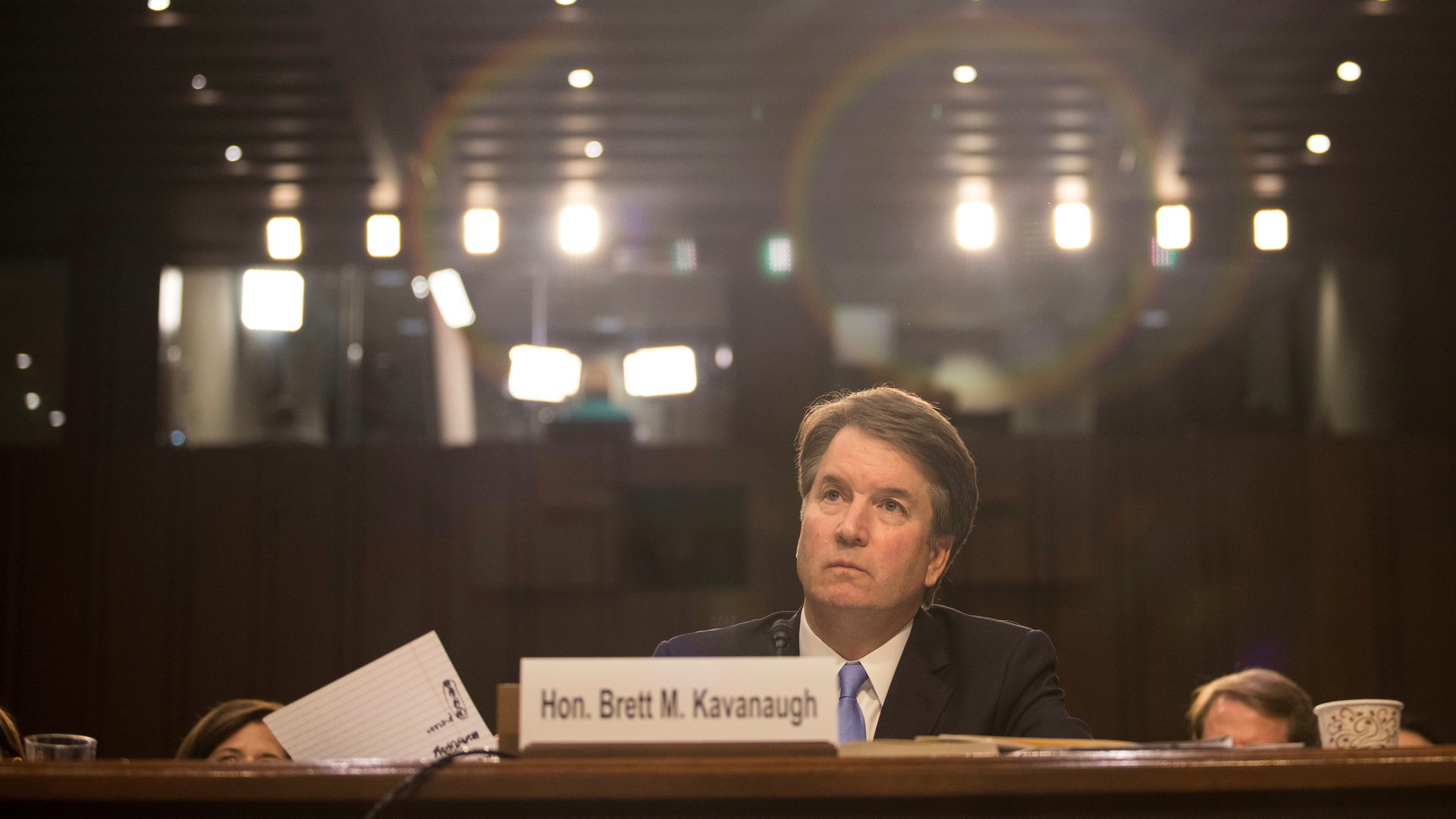“Innocent until proven guilty” doesn’t apply to job interviews
The presumption of innocence until proven guilty is a basic legal right guaranteed to all Americans, and supporters of US Supreme Court nominee Brett Kavanaugh are upset he hasn’t been granted it, with his confirmation getting stalled by accusations of sexual misconduct.


The presumption of innocence until proven guilty is a basic legal right guaranteed to all Americans, and supporters of US Supreme Court nominee Brett Kavanaugh are upset he hasn’t been granted it, with his confirmation getting stalled by accusations of sexual misconduct.
The chairwoman of the Republican National Committee, Ronna Romney McDaniel, recently accused US senator Mazie Hirono of Hawaii of misunderstanding American law. “A Democrat on the Judiciary Committee (who graduated from law school) doesn’t believe in the presumption of innocence for conservatives,” McDaniel wrote on Twitter. “That’s terrifying and goes against the bedrock of our entire justice system.”
It was McDaniel who misunderstood justice, however.
Kavanaugh has not been accused of a crime by a prosecuting body. His liberty isn’t at stake. He’s just a guy who’s up for a job. When you’re applying for a job, an employer doesn’t have to prove you’re guilty beyond a reasonable doubt to discard you from the running. They can simply not hire you, deciding you’re not a good fit, and there’s no onus on them to provide evidence that you’ve done something wrong. Or as Hirono told MSNBC, “Look, we’re not in a court of law. We’re actually in a court of credibility at this point.”
Even when you’re up for a seat on the highest court in the land, you simply can’t expect the protections granted by the justice system, because a confirmation hearing is not a legal venue. The presumption of innocence, which places the burden of proving guilt on an accuser, applies only to state actors like prosecutors, not in the employment context.
No one knows this better than Kavanaugh himself, although he’s not totally straightforward in his discussion of the presumption of innocence because the general public’s legal confusion kind of works for him. On Sept. 24, the judge spoke to Martha MacCullum of Fox News on The Story. She asked him about the accusations against him and mentioned that, by law, one is innocent until proven guilty. The judge didn’t correct her and say that only applies when you’re charged with a crime, but he also didn’t quite take her up on her offer to talk about how the legal tenet shields him in this case because, well, he’s steeped in the law and knows that would be wrong, technically speaking.
Instead, Kavanaugh said that “America is about fairness” and that “process protects” people. He said that the minimum process this situation demands is that he be given the opportunity to defend his integrity in a Senate hearing.
The answer is disingenuous, however, because, as a job applicant, he’s not due any process in this context. While an employer can’t discriminate against a prospective employee based on age, race, religion, marital status, disability, or citizenship, the hiring process doesn’t require a trial to show an employee isn’t fit for a particular position. It’s up to the employer entirely whether or not they find you desirable.
That is why Kavanaugh is scrambling right now. Technically, the nominee hasn’t been accused of a crime, not by any government entity. But his character and credibility are being widely questioned, which means his suitability for a position on the Supreme Court is, too.
There’s no particular plan laid out that dictates how Congress should navigate accusations like the ones Kavanaugh is facing—even in the wake of justice Clarence Thomas’s confirmation hearings in 1991. Anita Hill, the lawyer who accused Thomas of on-the-job harassment, wasn’t allowed to call any witnesses on her behalf while herself submitting to a thorough grilling by an all-male judiciary committee. The non-process was widely derided as a debacle but no guidelines have since been put into place, prompting Hill to express disappointment in a Sept. 18 op-ed in the New York Times (paywall). Hill wrote:
Today, the public expects better from our government than we got in 1991, when our representatives performed in ways that gave employers permission to mishandle workplace harassment complaints throughout the following decades. That the Senate Judiciary Committee still lacks a protocol for vetting sexual harassment and assault claims that surface during a confirmation hearing suggests that the committee has learned little from the Thomas hearing, much less the more recent #MeToo movement.
Due process of law does protect people who are accused of crimes because their liberty is at stake. They can end up in prison, so it has to be extremely difficult to prove guilt and lock them up.
But don’t get confused. When you’re interviewing for a job, whether as the highest judge in the land or anything else, no process is due you and an employer is free to reject you, whether or not you’ve ever done wrong. For better or worse, we’re not entitled to jobs, however qualified we believe we are or how grueling and fraught the application process.